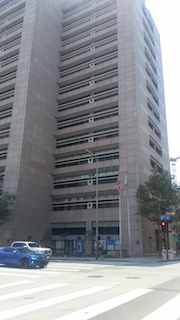In 2014, Donnell Luper was found not guilty by reason of insanity (NGI) of felony vandalism (Penal Code §§ 594(a), (b)(1)) and was committed, pursuant to Penal Code § 1026, to a state hospital.
In 2020, pursuant to the People’s petition, the trial court judge in Los Angeles County, Robert Harrison, ordered Luper’s commitment extended for two years pursuant to Penal Code § 1026.5(b). This was the second extension of Luper’s commitment.
Luper filed a notice of appeal of this second two-year extension of his commitment to the mental hospital and was appointed counsel by the Second Appellate District Court to prepare such an appeal.
In his brief, Luper’s counsel advised that he had reviewed the record of the § 1026.5 proceedings and found no arguable issues to raise on appeal. Counsel further advised Mr. Luper of his right to file a supplemental brief within 30 days of September 7, 2021, identifying any issues he believed warranted review and of his right to a copy of the record on appeal to facilitate such briefing. These are the required steps an appellate attorney must take in accordance with the procedures explained in
People v. Wende (1979) 25 Cal. 3d 436.
The
Wende procedures were established in California in response to the U.S. Supreme Court’s holding in
Anders v. California (1967) 386 U.S. 738 that an indigent criminal defendant in a first appeal of right is entitled to a full review of the record by the appellate court if counsel fails to identify any arguable basis for appeal.
Wende,
supra, 25 Cal. 3d at 441.
The Second Appellate District Court also notified Mr. Luper of his right to file a supplemental brief.
Mr. Luper then did not file anything. Counsel for Mr. Luper, however, requested that the Second Appellate District independently review the record for error pursuant to
Wende.
In a published opinion titled
People v. Donnell Luper, filed February 14, 2022, the Second Appellate District declined to engage in such a review. It began its ruling by stating that, even as appellant counsel for Luper acknowledged, his request for
Wende review conflicts with published authority. Specifically, Division Three of the Fourth Appellate District, in
People v. Martinez (2016) 246 Cal. App. 4th 1226, 1240, held that
Wende review is unavailable in appeals of orders pursuant to Penal Code § 1026.5 extending NGI commitments.
Counsel for Luper, however, urged the Second Appellate District to not follow
Martinez and instead read Penal Code § 1026.5(b)(7), as interpreted in
Hudec v. Superior Court (2015) 60 Cal. 4th 815, as mandating
Wende review of NGI commitment extensions. Subdivision (b) of section 1026.5 afford the NGI respondent “the rights guaranteed under the federal and State Constitutions for criminal proceedings” and provided that “[a]ll proceedings shall be in accordance with applicable constitutional guarantees." Penal Code § 1026.5(b)(7).
The California Supreme Court, in
Hudec found that subdivision (b)(7) affords NGI respondents the right to refuse to testify in 1026.5 commitment extension hearings because such a right is guaranteed to criminal defendants in criminal trials.
Therefore, the Second Appellate District distilled down the issue to be whether
Hudec and Penal Code § 1026.5(b)(7) applies to appeals of orders extending a commitment, not really whether
Wende /
Anders applies to such appeals.
The Second Appellate District found that by its terms, Penal Code § 1026.5(b)(7) does not apply to such appeals. It only applies to commitment extension proceedings before the trial court and no in any subsequent appeal. The paragraphs under 1026.5(b) describe procedures that apply only to the superior court hearing. They describe the timing and form of the petition ((b)(2)), required notice to the NGI respondent of his right to counsel and a jury trial ((b)(3)), incorporate by reference the rules of discovery for criminal proceedings ((b)(3)), provide for the transfer of respondent during the pendency of the hearing as necessary to bring him “within a reasonable distance from the court” ((b)(5)), and require appointment of the county public defender or State Public Defender if the respondent is indigent ((b)(7)). Nowhere does it address appeals from extension orders.
In short, there is no right to an independent review of the entire record by the appellate court after appointed counsel finds no grounds for an appeal.
We bring this summary to the reader’s attention because the procedures and case law surrounding NGI proceedings can be confusing and by this article, we hope to clarify this area.
The citation for the Second Appellate District Court ruling discussed above is People v. Donnell Luper (2nd App. Dist., 2022) 73 Cal. App. 5th 1077, 288 Cal. Rptr. 3d 875.
For more information about mental competency / capacity issues, please click on the following articles:
 Second Appellate District Court of Appeal CA Los Angeles
Second Appellate District Court of Appeal CA Los Angeles